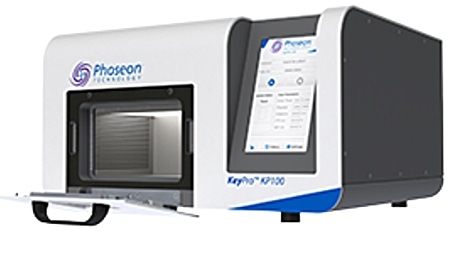Phoseon’s KeyPro™ family of products uses high-intensity, deep ultraviolet light to disinfect and decontaminate laboratory equipment and surfaces. Independent testing has shown efficacy of KeyPro against viruses, bacteria, fungi, and biomolecules like ribonuclease. KeyPro successfully inactivates influenza A virus in less than 5 seconds (see figure 1). Novel Coronavirus and Influenza A are both enveloped RNA viruses and may be susceptible to UV inactivation under similar conditions.

Figure 1: Rapid Inactivation of Microorganisms using UV LED
For vaccine development, researchers routinely need to work with inactivated viruses that have structures preserved. Preliminary results indicate that some viruses can be completely or partially inactivated with UV LED technology while retaining recognition features and antibody function. Retaining recognition features is challenging with existing methods of virus inactivation.
Phoseon KeyPro™ KP100 decontamination system is a stand-alone system where samples can be exposed to a controlled intensity and dose of UVC radiation (278nm), providing validated, simple and fast decontamination of microplates and preparatory slides. KeyPro™ KeyPro allows researchers to decontaminate microplates, inactivate viruses, and disinfect labware surfaces from bacteria and viruses.

KeyPro KP100 Decontamination System
In addition to KeyPro KP100, Phoseon offers a wide range of KeyPro UVC Germicidal/Virus Inactivation lamps (278 nm) for various applications such as virus inactivation, pathogen research and materials research and development. These lamps are available in various sizes for easy integration.